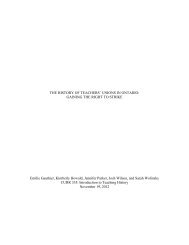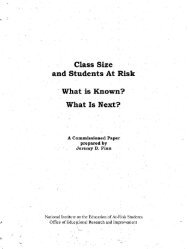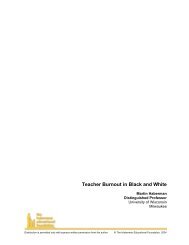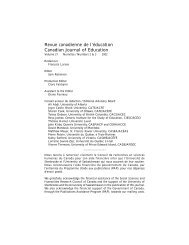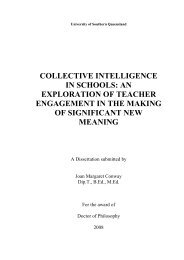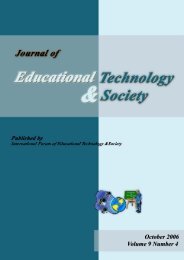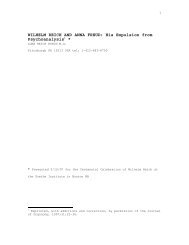Student Engagement: What do we know and what should we do?
Student Engagement: What do we know and what should we do?
Student Engagement: What do we know and what should we do?
Create successful ePaper yourself
Turn your PDF publications into a flip-book with our unique Google optimized e-Paper software.
others have ebbed. There is much discussion about the “new literacies” required for these<br />
“new learners” to thrive in the world. The good news is the youth of today are ready,<br />
willing, <strong>and</strong> able to learn how to learn; they are interested in tools <strong>and</strong> in topics – as long<br />
as they are relevant to their goals. They have changed <strong>and</strong> are open to more change.<br />
Education Systems have Not Changed<br />
In the face of the outlined changes in young people, how have education systems<br />
responded? Most haven’t! Or, more to the truth, education systems <strong>and</strong> teachers are only<br />
beginning to respond. Some suggest that teachers risk burning out or becoming<br />
“obsolete” if they try to keep up to changing student dem<strong>and</strong>s using outdated teaching,<br />
aging pedagogies, non-responsive curricula <strong>and</strong> assessment st<strong>and</strong>ards, all occurring in<br />
“un-connected” classrooms. When educational practices <strong>and</strong> classroom activities fail to<br />
engage learners, behavioral issues often follow, which create higher levels of stress for<br />
teachers, administrators, <strong>and</strong> students. “Research has indicated that student misbehavior,<br />
often a result of disengagement, is a major predictor of teacher burnout” (Covell, McNeil,<br />
& Ho<strong>we</strong>, 2009, p. 282). Yet, “when children are behaving in a socially responsible,<br />
rights-respecting way in the classroom, <strong>and</strong> particularly when they are actively involved<br />
in their classroom <strong>and</strong> school activities, teachers have improved relationships with the<br />
students <strong>and</strong> a greater sense that their teaching is effective” (Covell, et al, 2009, p. 288).<br />
Tapscott (1998) <strong>and</strong> Prensky (2001) assert that education systems <strong>do</strong> not align to the<br />
needs of these learners, which leads to increasing levels of disengagement reported in<br />
more recent studies by Willms, et al. (2003) <strong>and</strong> others. Early on, Tapscott (1998)<br />
suggested that education in developed countries was in crisis <strong>and</strong> would soon experience<br />
even more challenges: “There is growing appreciation that the old approach [of didactic<br />
teaching] is ill-suited to the intellectual, social, motivational, <strong>and</strong> emotional needs of the<br />
new generation” (p. 131). Prensky (2001) echoed that: ‘Our students have changed<br />
radically. Today’s students are no longer the people our educational system was<br />
designed to teach’ [emphasis in original] (p. 1).<br />
Covell et al (2009) point us to another key aspect of student engagement that students<br />
surveyed by Willms <strong>and</strong> others deem to be important – respectful relationships.<br />
Relationships bet<strong>we</strong>en teachers <strong>and</strong> students have changed in recent years, as have<br />
relationships bet<strong>we</strong>en students <strong>and</strong> students, <strong>and</strong> bet<strong>we</strong>en the student <strong>and</strong> the educational<br />
facilities <strong>and</strong> systems in which they learn. Institutions are no longer considered the only<br />
place where one can learn, <strong>and</strong> listening to a teacher is no longer the only way one can<br />
gain <strong>know</strong>ledge. Today’s youth challenge their leaders <strong>and</strong> institutions, <strong>and</strong> assume their<br />
opinions <strong>and</strong> questions will be respected. In a traditional school, such “challenging”<br />
behavior was considered disrespectful. When children are respected <strong>and</strong> allo<strong>we</strong>d to<br />
exercise their rights to learn in more empo<strong>we</strong>ring ways, “they are more engaged in school<br />
<strong>and</strong> their teachers demonstrate a greater sense of accomplishment <strong>and</strong> satisfaction with<br />
their teaching” (Covell, et al, 2009, p. 289).<br />
<strong>Student</strong>s today want their learning to be relevant, current, socially engaging, exploratory,<br />
<strong>and</strong> responsible. Expecting students to sit still <strong>and</strong> be attentive for five hours a day,<br />
listening to content they deem unimportant is a recipe for failure for most students,<br />
<strong>Student</strong> <strong>Engagement</strong>: <strong>What</strong> <strong>do</strong> <strong>we</strong> <strong>know</strong> <strong>and</strong> <strong>what</strong> <strong>should</strong> <strong>we</strong> <strong>do</strong>? 35




